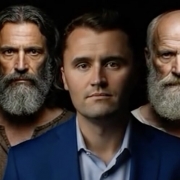Do you hear what I hear?
This article originally appeared at Baptist News Global on November 25, 2025.
As Thanksgiving dinner dishes clink and clatter this Thursday afternoon, millions of Americans will open their phones and begin playing Christmas music. One of the EP’s they’ll likely see is “A Soulful Christmas,” which contains four songs by a new artist named Solomon Ray.
The cover art shows a young, attractive smiling Black man with a fedora and a comfortable jacket walking through the warm glow of Christmas lights down a quaint, quiet street as the cool winter gray sky rests in the background.
 Solomon has quickly become a star in Christian music, with his hit “Find Your Rest” climbing the charts to the No. 1 spot for the Christian category in Apple Music. And in a nation filled with such racial unrest, it’s encouraging for many to see a Black man being welcomed so enthusiastically in a category whose listeners are made up in large part by white evangelicals.
Solomon has quickly become a star in Christian music, with his hit “Find Your Rest” climbing the charts to the No. 1 spot for the Christian category in Apple Music. And in a nation filled with such racial unrest, it’s encouraging for many to see a Black man being welcomed so enthusiastically in a category whose listeners are made up in large part by white evangelicals.
But there’s a catch.
Solomon Ray isn’t Black. Ray also isn’t a man. In fact, Ray isn’t even human. Instead, Ray and the music that rose to the top spot on the Christian charts are created by artificial intelligence.
Battle of the AI bands
We’ve all seen AI images and videos becoming more popular on social media. While they’re often easy to spot, their prevalence has led to many people exchanging their sense of innocent wonder for suspicion that anything beautiful they see might be fake.
Now, AI is becoming more popular in the music world. One example is the AI band “The Velvet Sundown,” which took off on Spotify this summer and acquired more than a million listeners a month, but turned out to be entirely created by AI. Similarly, the country song “Walk My Walk,” which has garnered more than 3 million plays on Spotify, also is AI.
Supporters of utilizing AI in music point to the way it democratizes the music industry. No longer does one have to wait for gatekeepers to offer them a record deal or spend years trying to save up enough money to afford to fund an album on their own. Now they can produce a hit in their basement overnight, as in the case of Solomon Ray.
The creation of Solomon Ray
“I co-write with ChatGPT,” the creator of Solomon Ray told Billboard. “I put in, ‘I want a gospel song, with a choir, here are the lyrics, here’s what I want the hook to be.’ I changed this, changed that, and eventually, once I got the song how I wanted to flow the words, lyrically, I copied and pasted that into Suno.”
Suno is a program where users create and arrange songs by combining AI-generated content with their own uploads.






Leave a Reply
Want to join the discussion?Feel free to contribute!